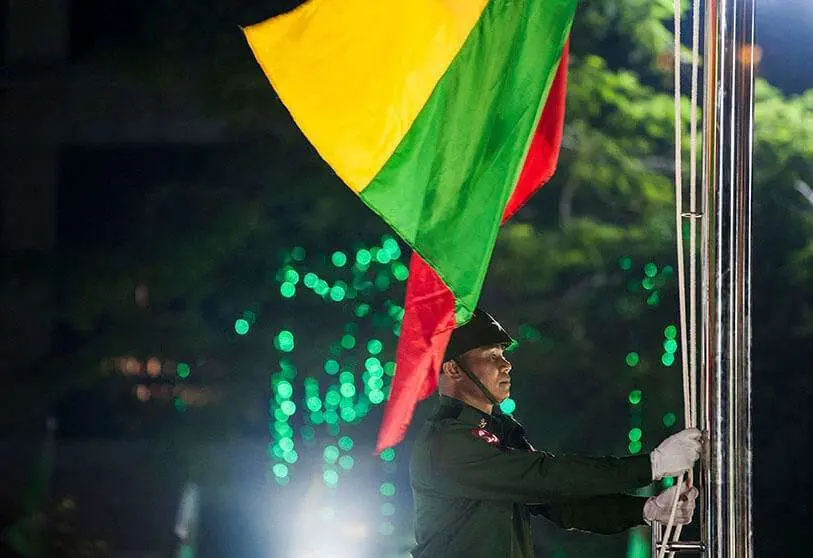Myanmar: for every step forward, two steps backwards

Looking back to World War II helps us understand some of the particularities of Myanmar's perennial instability. One of the consequences of becoming one of the most violent and devastating theatres of war during the Japanese invasion in World War II was to leave a deep mark of division, in large part a consequence of the alliance of ethnic Burmese with the Japanese Empire against the British Empire, which at the time occupied Myanmar.
The Japanese invasion granted the country nominal independence under the puppet government of Ba Maw. Disaffected sections of the nationalist Myanmar Independence Army literally took to the bush, where they made contact with the Communist Party of Myanmar and reached an agreement to form a united front, called the Anti-Fascist People's Freedom League, led by Myanmar National Army leader Bogyote Aung San, who ordered his militia to rise unexpectedly against the Japanese invader (in whose service they had hitherto been) in early 1945. In doing so, he succeeded in forcing the British to leave, which brought Myanmar independence in 1947, a posthumous achievement, as he was soon assassinated by a political rival. The use of violence in politics is therefore well known to his daughter Aung San Suu Kyi, who led the country - with zero sensitivity to ethnic minorities and human rights - until the coup of February 2021, which ended a decade of modest military-backed democratic reforms preceded by half a century of military rule, allowing the military to articulate a constitution over whose reform they hold a veto, and which gives generals the constitutional right to dissolve the national parliament. This stipulation has precisely allowed them to overthrow Aung San Suu Kyi's government under the pretext of electoral fraud, pre-emptively anticipating a constitutional reform that would call into question the safeguard clauses with which they hold the upper hand, and above all, risk their impunity.
In any case, the timing of the uprising, which coincides with the launch of the Biden administration, cannot be seen only in terms of a domestic issue. On the one hand, despite China's veto in the UN Security Council of a resolution condemning the coup, it is questionable whether Beijing was behind the coup, rather than the military seeking closer ties with China: one of the motivations for the limited openness allowed in recent years by the military was a serious concern about becoming a mere satellite of China, something the generals sought to prevent through a rapprochement with the US, as high-flown rhetoric had placed an ostracised Myanmar in Chinese hands between 1980 and 1990.
So far, the muted reaction of both Washington and the ASEAN countries suggests that these countries have understood that a return to this situation would be of no benefit to them, something that will plausibly have been part of the military's calculations, knowing that the expected trade sanctions cannot cross the line beyond which those who impose them would be throwing stones at their own rooftops.
It is not just that some of these countries, such as Thailand, Indonesia, Malaysia, the Philippines and Cambodia, have suffered marked setbacks in their democratic quality, which do not allow them to give lessons to third parties, but that, in reality, they have as little interest in Myanmar entering a vortex of instability as China itself, the country's main economic partner, and for the same reasons: ASEAN companies, most notably Japan, have invested heavily in Myanmar with the support of their governments, and are unlikely to pursue a policy that gives away a strategic advantage to China. In this regard, the US cannot be drawn into the toxic narrative of Washington polarisation, ignoring the crucial interests of its Asian allies in Myanmar, especially those of the members of the QUAD Group, the embryonic NATO in Asia. Myanmar shares a 2,129-kilometre border with China to the north and has a 1,920-kilometre coastline on the Indian Ocean. The last thing in the interests of the QUAD Group is to give incentives to the Burmese military - which has never acted against US geostrategic interests - to facilitate a Chinese economic corridor leading to the Bay of Bengal, right under India's nose.
Consequently, US and allied options are limited by geopolitical, but also moral imperatives. Western countries should not fuel street protests that, given the nature of the regime, could not in themselves alter the course of events, but could easily lead to the use of force by the military administration, resulting in a massacre like that of the hundreds of students killed during the 1988 popular uprising. Similarly, Washington and its partners should refrain from imposing economic sanctions that would aggravate the country's deep poverty crisis, penalising its most vulnerable population.
There are no good solutions for Myanmar; only some that are less bad than others. If the White House is genuinely interested in improving the situation of the Burmese, any way out will inevitably involve China, so that it becomes part of the solution rather than a problem. Maintaining the political mettle required to do so will not be easy in this unbreathable political climate in the US. However, what is at stake in the region cannot be overcome by showboating and grandstanding, but through the exercise of diplomacy that is as discreet as it is realistic.

